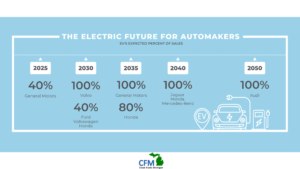Eight auto manufacturers – Jaguar, General Motors, Volvo, Ford, Volkswagen, Mercedes Benz, Honda, and Audi – have made bold commitments to electrify the vehicles they sell. Across the automotive industry, companies are committing to the transition to electric powertrains – a move that will reduce emissions and provide customers with more choices in how they get around. From sports cars to pickup trucks to minivans, there will soon be an electric car option for everyone.

Leading the Transition
The timeline pictured above illustrates the strong commitments that companies are making to sell more electric vehicles over the coming years. Five companies – Volvo, Jaguar, GM, Mercedes-Benz, and Honda – are all expecting 100% of their vehicle sales to be electric by 2040 (Volvo and GM actually think it will be sooner!).
Not only are companies committing to switch to electric vehicles, but some are also committing to eliminating carbon emissions from their manufacturing, too. For example, GM will source renewable energy to power its U.S. sites by 2030 and all global sites by 2035. Audi, Jaguar, Ford, Volkswagen, Toyota, and Volvo also promise to be carbon neutral in their manufacturing by 2050.
Why the Transition?
While the switch to producing only electric vehicles in renewable-powered facilities will certainly benefit the environment, companies are making the bet to go electric now because it gives them a competitive advantage. The cost to produce batteries is going down, which brings down the cost to manufacture electric vehicles. This means that “price parity” – when the cost of an electric vehicle will equal the cost of an equivalent combustion engine vehicle – is within reach. GM executive Dane Parker justified the company’s decision to go all-in on the future of electric vehicles in his comment: “the decision… was based on a fundamental, dollars-and-cents analysis of where the auto industry is headed and the cars that [GM] expects to become best sellers in the future.”
Looking to the Future
The question is no longer whether electric vehicles are here to stay, but how fast will they become the predominant passenger vehicle. The transition to electric vehicles is underway, and it has many long-term implications for Michiganders. To be adequately prepared, we will need a developed network for charging infrastructure so that consumers can easily recharge their vehicles, a developed supply chain for electric car components and batteries, and continued investments in our Michigan know-how so that we are leaders in the development, manufacturing, and distribution of electric cars. It’s time to buckle up, we’re on the way to the electric future!

